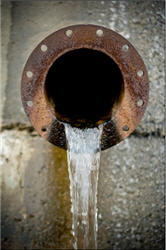New computer modeling work shows that by 2100, if society wants to limit carbon dioxide in the atmosphere to less than 40 percent higher than it is today, the lowest cost option is to use every available means of reducing emissions.
The reefs, which provide habitat for popular sport fish and other marine life, pulled more than $253 million into the region during one year, the study found. Though it costs nothing more than a saltwater fishing license to use the submerged structures as a fishing spot, anglers spend money on food, lodging, fuel, tackle and other necessities.
According to a new paper by researchers around the team of Sönke Zaehl from the Max Planck Institute for Biogeochemistry, nitrogen's detrimental effects on the climate roughly correspond to its climactic benefits. In fact, the scientists' findings suggest that the negative impacts of nitrogen may even slighty prevail.

For the last 10,000 years, summer sea ice in the Arctic Ocean has been far from constant. For several thousand years, there was much less sea ice in The Arctic Ocean – probably less than half of current amounts. This is indicated by new findings by the Danish National Research Foundation for Geogenetics at the University of Copenhagen.
New research published in the journal Biogeosciences provides a detailed account of how carbon naturally flows into and out of crops themselves as they grow, are harvested and are then eaten far from where they're grown. The paper shows how regions that depend on others to grow their food end up releasing the carbon that comes with those crops into the atmosphere.
Changes in ocean chemistry due to increased carbon dioxide (CO2) emissions are expected to damage shellfish populations around the world, but some nations will feel the impacts much sooner and more intensely than others, according to a study by scientists at Woods Hole Oceanographic Institution (WHOI, USA).
Over one-third of the world's population already lives in areas struggling to keep up with the demand for fresh water.
Ensuring that a population of fish is breeding naturally within their holding pens is a sustainable fish farming goal.
The Metropolitan St. Louis Sewer District has agreed to make extensive improvements to its sewer systems and treatment plants to eliminate illegal overflows of untreated raw sewage and to reduce pollution levels in urban rivers and streams.
Writing in the journal Annals of Botany, Professor Douglas Kell argues that developing crops that produce roots more deeply in the ground could harvest more carbon from the air, and make crops more drought resistant, while dramatically reducing carbon levels.
Residents in the Midwest awoke to the highest mold count for the season after a night of torrential rain and lightening strikes. An official air alert was issued by Joseph Leija, MD, allergist who performs the official allergy count for the Midwest for the National Allergy Bureau.
To date, many academics and government officials have argued that putting a price on carbon – most commonly through taxes or emissions trading – is all that is needed to overcome every possible barrier to delivering cost-effective energy efficiency improvements.
Researchers from the University of Michigan and Ford Motor Co. have assessed the global availability of lithium and compared it to the potential demand from large-scale global use of electric vehicles.
Rice – which provides nearly half the daily calories for the world’s population – could become adapted to climate change and some catastrophic events by colonizing its seeds or plants with the spores of tiny naturally occurring fungi, U.S. Geological Survey-led research shows.
Coccolithophores, a certain group of algae, form thinner calcite skeletons when the pH value in the ocean drops. In marine ecosystems, changes in the degree of calcification are much more pronounced than presumed to date based on laboratory tests. These changes have an impact on the global carbon balance since the examined microalgae influence the carbon dioxide exchange between ocean and atmosphere.
Carbon dioxide still plays a major role in climate change, but other greenhouse gases contribute to the problem.
The Department of Energy's L Prize challenged the lighting industry to develop high-performance, energy-saving replacements for conventional light bulbs that will save American consumers and businesses money.

While water scarcity presents a global crisis, one software-as-a-service company is using technology to reduce water loss through faulty infrastructures.
This practice of sampling and analyzing tissue from trees and other plants to determine the presence of contaminants in soil and groundwater holds promise because it gives engineers a quick, accurate and inexpensive way to measure the extent of environmental pollutants without having to dig into the ground.
While the popularity of locally and regionally grown food is on the rise among Americans, food accessibility remains a major concern for those with limited financial resources.